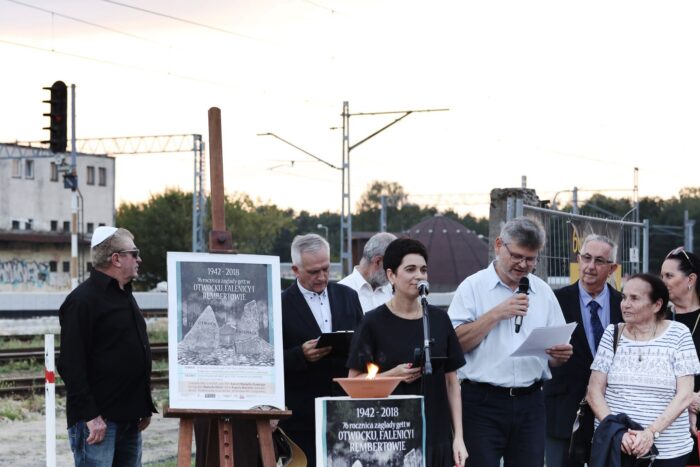
While some in my family were turned over to the gestapo by neighbors and the Polish “blue police” – because I didn’t experience the war, I prefer to learn from the brave heroes who saved my family.
Speech delivered by Karen Kirsten at the march of remembrance and prayer in Otwock, on August 19, 2018.
In 1895, my greatgreatgrandfather Józef Przygoda had this crazy big idea to build a large wooden building in the middle of a pine forest – a sanatorium on Warszawska 5. He invited people to recuperate there and to socialize. Józef was open to new ideas and breaking down barriers.
When we think about the people who lived in świdermajer buildings like the Przygoda sanatorium, the horrors experienced by my family (and some of yours) tend to be most prominent in our minds – and this is the reason why we are marching here today. But I find that celebrating and remembering the achievements and the camaraderie of people who lived here in the 1930’s, helps carry us into the future, while remembering the past.

Józef’s son Władysław, a renowned tuberculosis (TB) physician, followed in his father’s footsteps, bringing groundbreaking TB treatments to Poland, to Otwock. Władysław wanted better for the people of Otwock and Warsaw. As a member of the City Council he campaigned to switch trains from smoke-spewing coal to electricity, and electrical lines were constructed between Grodzisk, Warsaw and Otwock. Finally the TB patients of Otwock had REAL clean air to breathe.
Władysław and his wife Helena, raised their son Zdzisław, my grandfather, to challenge norms too. They lived between an apartment next to the Sanatorium on Dłuskiego street, and in Warsaw. Władysław and Helena intentionally enrolled Zdzisław at a mixed high school, Jewish and Catholic. But Zdzisław and his friends cared less about religion and home traditions, and more on chasing girls and ogling at cabaret dancers.
Zdzisław set up his architectural practice in Warsaw and designed some buildings in Otwock. A doctor at his father’s sanatorium introduced him to his future wife Irena. Irena had holidayed with her parents and siblings in Otwock every summer since she was a child. She danced to five-piece-orchestras in Otwock café’s, read books on the shady verandas or went to the movie theatre to watch movies like Robin Hood, and then nibbled eclairs in a café afterward.
Zdzisław was a captain in the Polish army and fought to defend Warsaw. After Irena and his newborn daughter, my mother, were smuggled out of the Warsaw ghetto with the help of brave Polish friends, Irena was shot and killed while hiding in Milanówek. Zdzislaw had false papers thanks to his Catholic friends. He joined the Armia Krajowa and was ultimately arrested and death-marched to Auschwitz, ending up in Natzweiler and Dachau.

In the 1970’s he returned to Poland to donate a spectrograph to the University of Toruń. He visited Otwock and the family sanatorium. He went to Milanowek and found where his wife had been buried.
Perhaps his open-mindedness helped him recover from what happened to him during the war. His best friend in concentration camp had been German. He told me he was proud to be Polish, and that he wouldn’t have survived without help from his high-school and army friends. The first book he gave me to read was about “Żegota”, the Polish underground organization to aid Jews––Irena Sendlerowa was its member. Zdzisław was interviewed in the book.
While some in my family were turned over to the gestapo by neighbors and the Polish “blue police” – because I didn’t experience the war, I prefer to learn from the brave heroes who saved my family.
Years ago, my mother traveled to Otwock to find the Przygoda sanatorium, and to look for the Catholic sisters who had hidden her during the war. She couldn’t find them. I came to Poland in 2012 to Otwock to see the sanatorium Zdzislaw had told me about, and to search for the Sisters. In Otwock I met Zbyszek, and he found the sisters. Later that year my mother traveled to Poland from Australia and we visited the convent where she was hidden (in Suchedniów) and met the sisters. They and others received Righteous Among the Nations medals for saving my mother and Zdzislaw.
So you see, thanks to Zbyszek and so many of you who have welcomed me to Otwock, Otwock has been a place of healing for my mother, and for me. Isn’t it fitting that a town of healing and community was precisely Jozef Przygoda’s vision for Otwock.